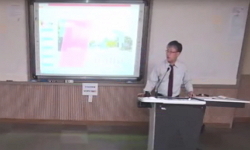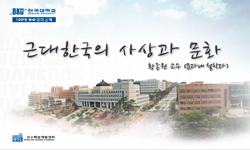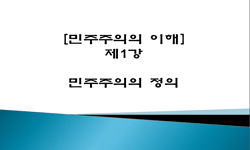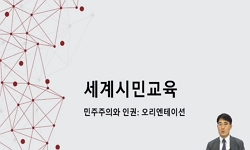이 논문의 목적은 한국의 대표적인 개화사상가인 유길준(兪吉濬 1856~1914)의 근대적 해외유학 경험과 그 문화수용의 성격을 재고찰하는 것이다. 지금까지 그에 대한 연구를 통해 그의 서구문...
http://chineseinput.net/에서 pinyin(병음)방식으로 중국어를 변환할 수 있습니다.
변환된 중국어를 복사하여 사용하시면 됩니다.
- 中文 을 입력하시려면 zhongwen을 입력하시고 space를누르시면됩니다.
- 北京 을 입력하시려면 beijing을 입력하시고 space를 누르시면 됩니다.

유길준의 해외체험과 민주주의의 유교적 수용 : 전통과 근대의 융합 = A study on Yu Kil-Joon’s overseas experiences and nature of cultural accommodation : harmony of traditionality and modernity
한글로보기https://www.riss.kr/link?id=A35496252
-
저자
안외순 (이화여자대학교 사회과학연구소)
- 발행기관
- 학술지명
- 권호사항
-
발행연도
2006
-
작성언어
Korean
-
주제어
유길준 ; 문화체험 ; 근대 ; 전통 ; 유교 ; 민주주의 ; 개화사상 ; 유교민주주의 ; 융합 ; Yu Kil-Joon ; cultural experiences ; modernity ; traditionality ; confucianism ; democracy ; enlightenment ideology ; confucian democracy ; harmony
-
KDC
380.000
-
등재정보
KCI등재
-
자료형태
학술저널
- 발행기관 URL
-
수록면
157-197(41쪽)
- 제공처
- 소장기관
-
0
상세조회 -
0
다운로드
부가정보
국문 초록 (Abstract)
이 논문의 목적은 한국의 대표적인 개화사상가인 유길준(兪吉濬 1856~1914)의 근대적 해외유학 경험과 그 문화수용의 성격을 재고찰하는 것이다. 지금까지 그에 대한 연구를 통해 그의 서구문물 수용관은 특히 유교적 성격 혹은 전통적 성격을 상당히 보유하고 있다는 합의가 이루어졌다. 그러나 아직 왜 그의 문명관 혹은 문화 수용관이 유교문화 혹은 전통문화를 보수 혹은 근대문화와의 융합을 취하게 된 것인지에 대한 연구는 미진했었다. 이 논문은 바로 이 점과 관련하여 그의 해외문화 체험을 접근하고자 한다. 이를 위해 필자는 해외유학 이전의 그가 조선에서 받은 교육의 성격에 주목하여 이를 구체적으로 소개하고, 이것이 이후 해외체험과 유기적 연관을 갖는다는 관점에서 접근하였다. 대략의 연구결과는 다음과 같다. 유길준은 해외 유학 이전에 조선의 전통적인 최고 엘리트 계열의 교육, 즉 일반적인 조선주자학 교육은 물론 조선말기 학문적 특징인 경화사족(京華士族) 중심의 학문을 교육받았다. 그 가운데서도 그는 특히 북학파적 실학(實學)의 산실로 청(淸)의 태서신학(泰西新學)까지 수용했던 그룹의 경화학풍을 학습했던 것이다. 그 결과 그는 해외유학 이전에 조선유교의 내재적이고 자발적인 근대화 노력을 수행하였던 그룹의 막내로서 조선유학에 대한 자부심을 가질 수 있었다(2장). 그런 그가 최초의 '근대 문명국가'인 일본과 미국에 유학하였다. 그곳에서 그가 새롭게, 그리고 구체적으로 체험한 배움은 근대 민주주의 정치제도의 중요성이었다. 그는 서구 국가의 부강함이 근본적으로 참정권을 중심으로 한 민주주의 정치체제의 채택과 인민의 자유권에 있음을 확신하였다(3장). 이러한 조선에서의 교육과 해외유학을 통한 학습은 귀국 후 그로 하여금 향후 조선의 진로에 대해 서구 근대 민주주의 정치제도와 전통 유교적 정치원리의 융합이라는 대안을 제시하게끔 만들었다. 그것은 전통의 장점과 근대의 장점을 취합하는 전통과 근대의 융합이었다고 하겠다(4장). 이러한 그의 전통과 근대의 융합 혹은 유교와 민주주의의 융합적 시도는 당시는 제국주의의 전개고 실패하였으나 탈근대적 대안을 모색하는 오늘날은 오히려 하나의 모델이 될 수 있다(5장).
다국어 초록 (Multilingual Abstract)
The purpose of study was to review nation's model enlightenment ideologist Yu Kil-joon's (1856-1914) overseas education experiences and nature of the cultural accommodation. Preceding studies about him seem to have agreed in a sense that his view of a...
The purpose of study was to review nation's model enlightenment ideologist Yu Kil-joon's (1856-1914) overseas education experiences and nature of the cultural accommodation. Preceding studies about him seem to have agreed in a sense that his view of accommodating the Western civilization and culture was much Confucian or traditional. However, few preceding studies have focused on why his view of civilization or cultural accommodation was harmony of Confucian or traditional culture and modern one. This study attempted to approach his experiences of foreign culture in this sense. To this end, the researcher focused on the nature of his education in Korea before his overseas education in order to determine an organic relationship between his two educational experiences. The results of this study can be summarized as follows; Before his overseas education, Yu Kil-joon was educated within an elite Confucian education system. Namely, he learned about general theories of Neo-Confucianism, while being educated on the subjects programmed for the high literati class residing in the capital. Among them, he learned about the theories developed by an academic group or a base for Northern Learning, who had accommodated even New Western Learning of Ching China. Thus, he was proud of Confucianism during Chosun dynasty, although he had been the last runner of Chosun Confucian scholars championing a spontaneous and voluntary modernization of Confucianism before his overseas education(Chapter Ⅱ). After all, he would study in the 'modern civilized nations' Japan and the United States for the first time among Koreans. What he learned anew and specifically there was the modern democratic political system. He would be convinced that the power and wealth of the Western nations were attributable to the democratic political system and people's rights of liberty(Chapter Ⅲ). Owing to his two different educational experiences in Chosun and overseas, he would suggest, upon returning home, the alternative to merge the Western modern democracy and the traditional Confucian politics. It was a merge of traditionality and modernity, taking advantages of the both(Chapter Ⅳ). Although such an attempt to merge Chosun's tradition and modernity or Confucianism and democracy failed due to invasion of imperialism, it may well be a good model today when a de-modern alternative should be explored(Chapter Ⅴ).
동일학술지(권/호) 다른 논문
-
무(無) 개념에 기반한 고석규 비평의 변모 양상과 그 의미
- 이화여자대학교 한국문화연구원
- 박찬효
- 2006
- KCI등재
-
- 이화여자대학교 한국문화연구원
- 허동현
- 2006
- KCI등재
-
- 이화여자대학교 한국문화연구원
- 문정희
- 2006
- KCI등재
-
- 이화여자대학교 한국문화연구원
- 이상일
- 2006
- KCI등재




 RISS
RISS KISS
KISS







